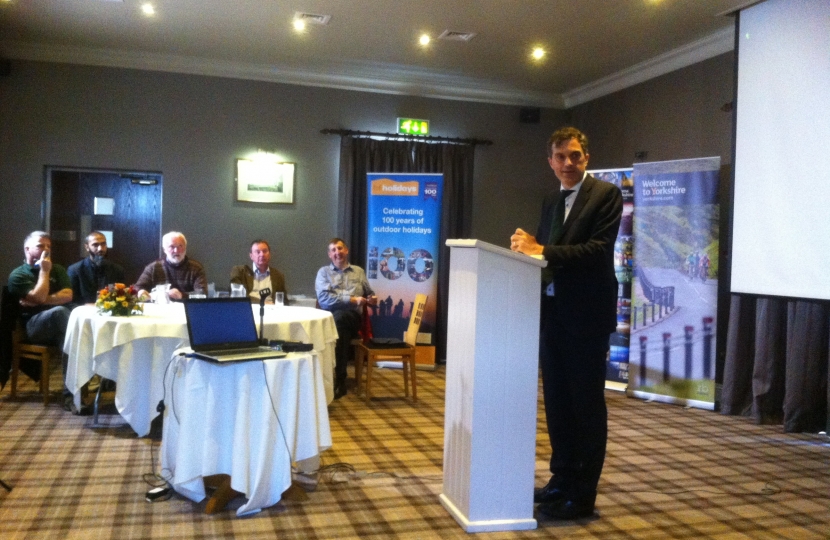
Julian has spoken at the National Park Societies Conference, which was held in Settle, on Friday ahead of the 60th birthday of the Yorkshire Dales National Park.
Here is the text of his speech:
Whilst I must be careful given the high calibre of national parks throughout our United Kingdom represented in this room, I hope you will agree following your tours this week to Malham, Upper Ribblesdale and Settle that the Yorkshire Dales National Park - on the eve of its 60th birthday - is in exceptionally good shape and that you will leave here very positive memories of this jewel in the crown of God’s own county.
The Tour de France this summer was a fantastic advertisement for the Yorkshire Dales and, as its chief Parliamentary supporter, I couldn't be more delighted with how it went - you are hearing from Gary Verity the man who made it happen later.
We are rightly proud of the work our Park Authority, aided by thousands of volunteers, has done to ensure that the two statutory purposes for English National Parks, protecting the landscape and promoting enjoyment of the Park, are fulfilled.
You have seen for yourselves here that the beauty, wildlife and natural heritage is being conserved and enhanced and that the Authority is doing everything it can to promote the enjoyment of the park to others
But in addressing the issue of the Conference today - 'opportunities for young people in Britain's special landscapes today', I want to talk about a third duty - that is the duty to foster the economic and social well-being of communities within national parks.
I don't want to embarrass the Chief Executive of the Yorkshire Dales National Park, who I greatly respect, but when I met him as a new MP he was at pains to point out - what is undoubtedly technically true - that the economic principle is not the primary one.
My concern then, and even more so today, is that this view whilst adhering to the letter of the law is sometimes used as an excuse not to maximise the economic growth opportunities of our National Parks. I simply don't believe that protecting landscapes automatically mean that they can't also be aggressive in the pursuit of economic growth.
Take two examples - signage and business expansion. I have lost count of the number of complaints from business as to the length and bureaucracy of the planning process they face from the park authority when it comes to even the most modest projects. These sorts of issues are by no way unique to Park Authorities but they are more pronounced here and mean that the perception of planners and of the park system from the point of view of businesses is of them being yet another block on enterprise.
Of course development needs to be rules based but it can be 'can do' as well. In an era where cities account for 80 per cent of world growth and 75 per cent of the population, highly rural areas need to do everything - and I mean everything - to encourage and support risk takers.
If it's a dispute over a few inches on a sign, I say let the business off, it's not worth the fight. We need the entrepreneur to focus on growth, on job creation and opportunities for young people.
Similarly, if a farmer wants to diversify let's back them wholeheartedly and give them the support they need, which will probably have the added bonus of supporting them to stay in the National Park and be a custodian well into the future.
If we don't support business and enterprise we will never successfully address the issue we are debating today, the future of young people in National Parks. Many young people would choose rural rather than city but they won't if they can't work or live here.
So my challenge to Authorities, and to you in your role in supporting and nudging, is to hire more staff who understand enterprise, challenge the time it takes for business applications to get through planning, focus relentlessly on telecommunications and data infrastructure and ensure you are promoting all of the schemes, grants and initiatives available.
Above all, when it comes to protecting our national parks it's not just environmental schemes and careful planning that are vital, it is the ability to ensure communities and young families have a reason and a means to come and to live in them. Without them, our landscapes will be under real threat and all the brilliant work since the 1950s that has been done to preserve them will be at risk.
